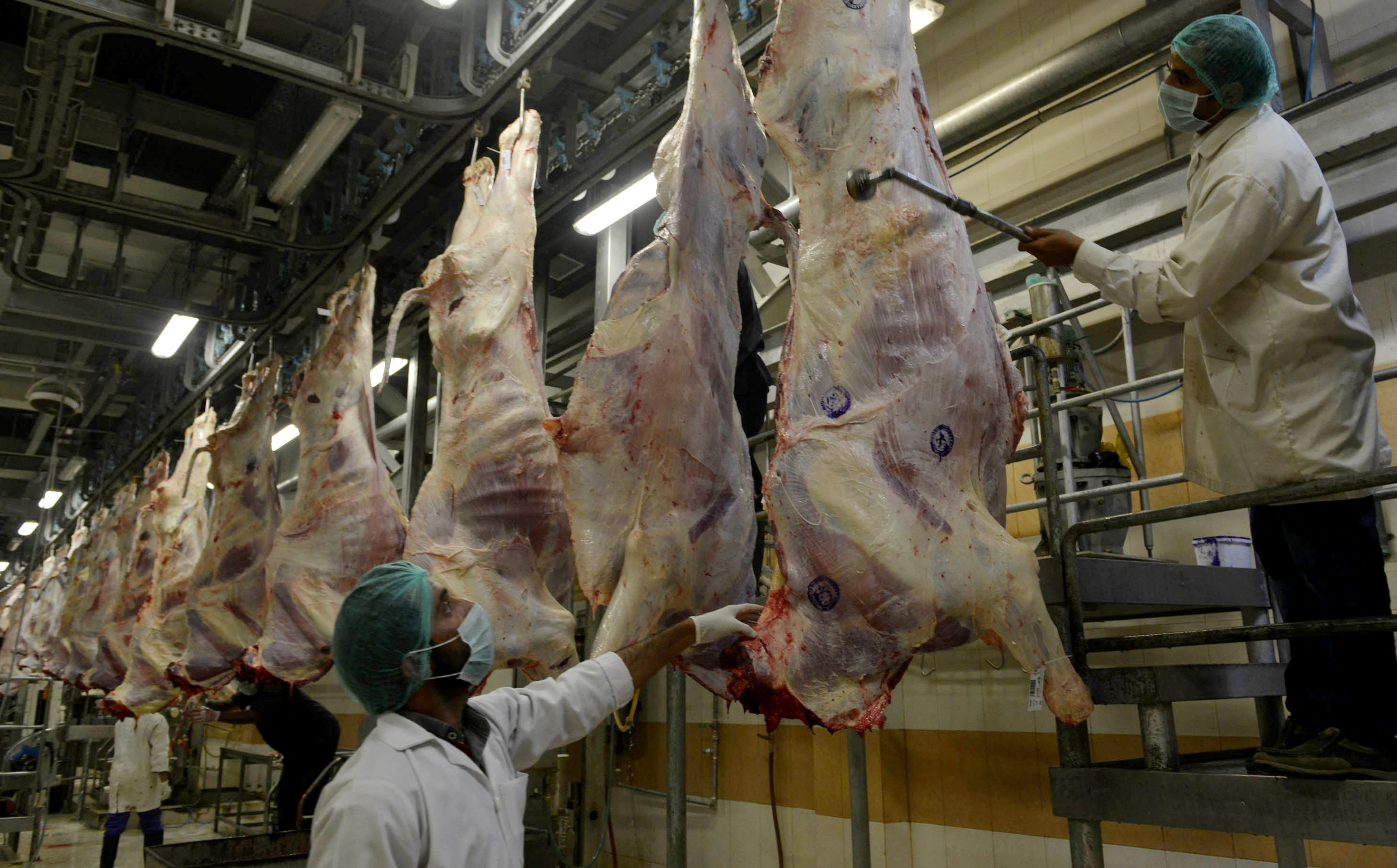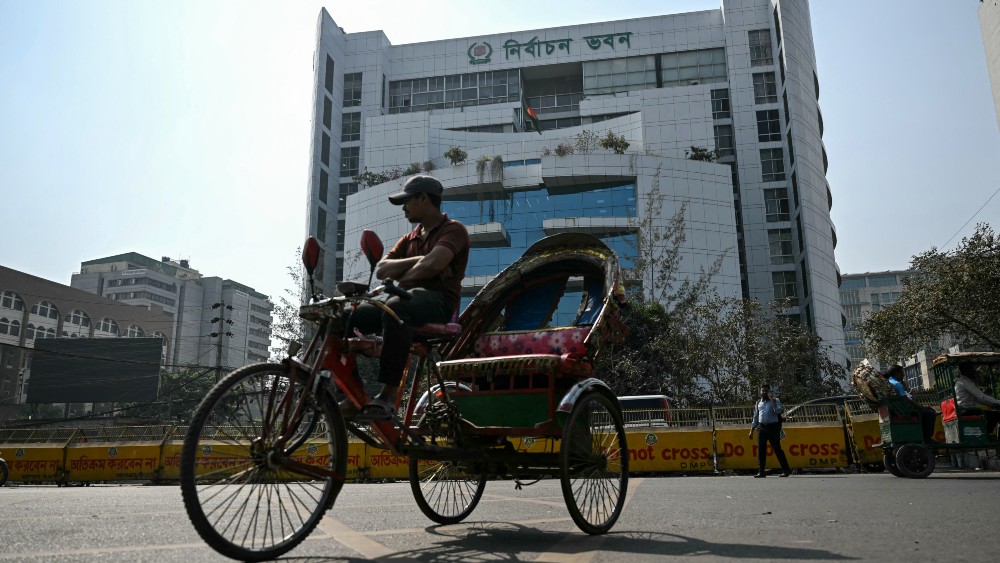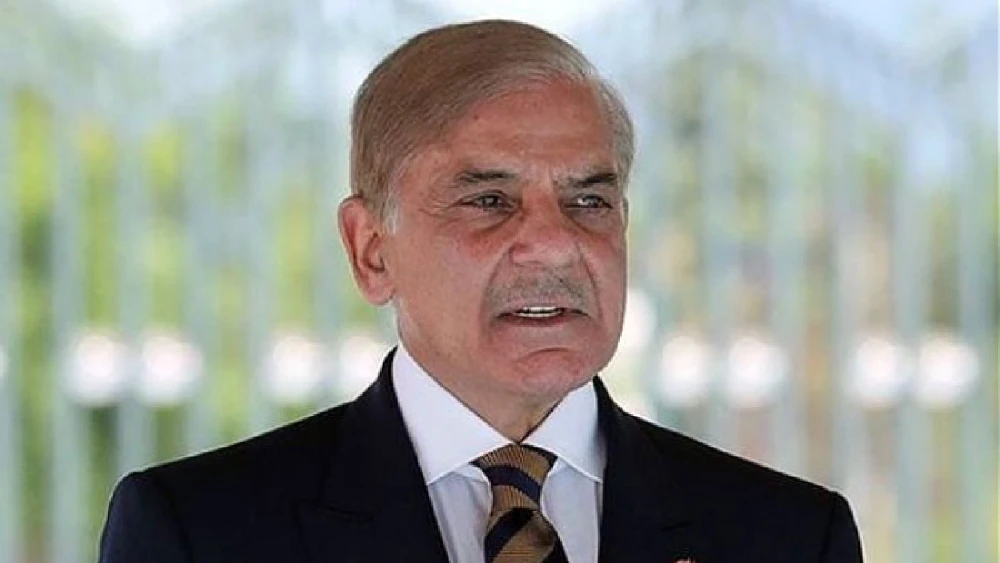Pakistan targets global halal market with reforms to boost meat exports

This photograph shows Pakistani health inspectors as they certify meat by placing stamps at a government slaughterhouse in Lahore. (AFP)
ISLAMABAD: Pakistan is advancing a strategy to expand its meat and agricultural exports, aiming to position itself as a major player in the global halal market through regulatory reforms, infrastructure upgrades, and international partnerships, officials and industry experts said.
The country aims to capture a larger share of the global halal market, valued at about $407.8 billion in 2023, according to a report by ICRIC, an affiliate of the Organization of Islamic Cooperation.
Success could generate billions in foreign exchange and create jobs for millions, though infrastructure deficits and regional competition pose significant challenges.
Untapped export potential
Pakistan has 251.3 million livestock, with a growth rate of 3.18% annually since 2006, according to the Pakistan Bureau of Statistics’ 7th Agricultural Census released in August 2024. The sector accounts for 63.6% of agricultural GDP and 14.97% of the total GDP, as per the Economic Survey 2024-25 released in June 2025.
The Ministry of National Food Security and Research reported in June this year that over eight million rural families rely on livestock as their main livelihood.
Despite this massive base, meat exports reached just $512 million with 123,515 tons in fiscal 2024 — a 20% increase from $426 million but under 3% of total exports, according to Pakistan Bureau of Statistics data reported in July 2024.
Over 97% of Pakistan's approximately 2.2 million tons of meat production is consumed domestically, according to the Trade Development Authority of Pakistan's Meat Export Strategy 2023-2027.
The government aims to address barriers through infrastructure investment, skills training and technology upgrades to modernize processing facilities, improve cold storage networks and strengthen disease control systems.
Infrastructure challenges
Infrastructure deficits remain the primary obstacle. In September 2025, the government announced plans to establish modern abattoirs and processing facilities nationwide to meet international halal standards.
Outdated cold chains limit capacity. Production costs reach $5 per kilogram compared with India's $3.5 per kilogram, as revealed during a meeting with PM’s Special Assistant Haroon Akhtar Khan with industry stakeholders on October 20, 2025.
Foot and Mouth Disease restricts access to premium markets. October 2025 discussions with Malaysia and Qatar addressed these challenges while opening cooperation channels. Pakistan also vowed to improve disease control, breeding programs and traceability systems.
Federal Minister for National Food Security and Research Rana Tanveer Hussain said at an October 19, 2025, meeting that Pakistan would overcome production costs and cold chain deficiencies through targeted interventions and public-private partnerships.
International cooperation
International partnerships provide access to expertise, technology and markets. October 2025 meetings with Australia, Malaysia, Qatar and the United States secured technical support. The Samsons Group is partnering with the Ministry of National Food Security and Pakistan Agricultural Research Council to improve livestock breeds, feed quality and disease control.
The partnership aims to position Pakistan in, while promoting value-added products and agro-tourism in areas including Malam Jabba Valley in Khyber Pakhtunkhwa.
Australia, which exported 1.69 million metric tons of beef in 2024, according to Meat and Livestock Australia, will provide technology transfer.
Discussions with Qatar and US focused on improving livestock genetics, disease management and research to enhance compliance and market access in the Middle East, Southeast Asia and beyond.
Private sector role
Private sector engagement drives the strategy. Government partnerships with private companies aim to modernize processing and boost export potential through capital investment. Their focus on value-added halal products aligns with growing global demand for certified, sustainable food.
Government-backed initiatives, including Samsons Group’s Malam Jabba Valley project, combine mountain agriculture and livestock development to create rural income and enhance sustainability.
Economic vision
Pakistan’s livestock population grew from 143 million in 2006 to 251.3 million in 2024, according to the Pakistan Bureau of Statistics.
Dr. Ikramul Haq, a leading Pakistani economist, says this growth presents a major opportunity for the country. “Pakistan has huge potential in this sector, thanks to its rapidly growing livestock population. With one of the largest livestock populations in the world, this subsector is vital, accounting for more than 60% of the country’s total agricultural economy,” he said.
He noted that boosting productivity, quality and compliance could drive significant growth in domestic and international markets.
Pakistan aims to increase competitiveness in key markets. The United Arab Emirates accounted for 39% ($200 million) and Saudi Arabia 28% ($142 million) of meat exports in fiscal 2024, according to Pakistan Bureau of Statistics data.
Expansion targets include Europe and Southeast Asia.
The strategy positions Pakistan as a major player in the halal market, leveraging its large livestock population, established halal practices, strategic location between Middle Eastern and Asian markets, and a young workforce.
Latest News
Bangladesh's Jamaat-e-Islami-led coalition submits poll complaints
4 MINUTES AGO

Chinese FM wants to work with Canadian counterpart to 'eliminate interference'
AN HOUR AGO
.jpg)
Pakistan, India set for decisive T20 World Cup showdown
AN HOUR AGO

French navy seizes 2.4 tonnes of cocaine in Pacific
2 HOURS AGO
.jpg)
Pakistan premier invited to Bangladesh PM hopeful Rahman's swearing-in ceremony: Report
3 HOURS AGO
